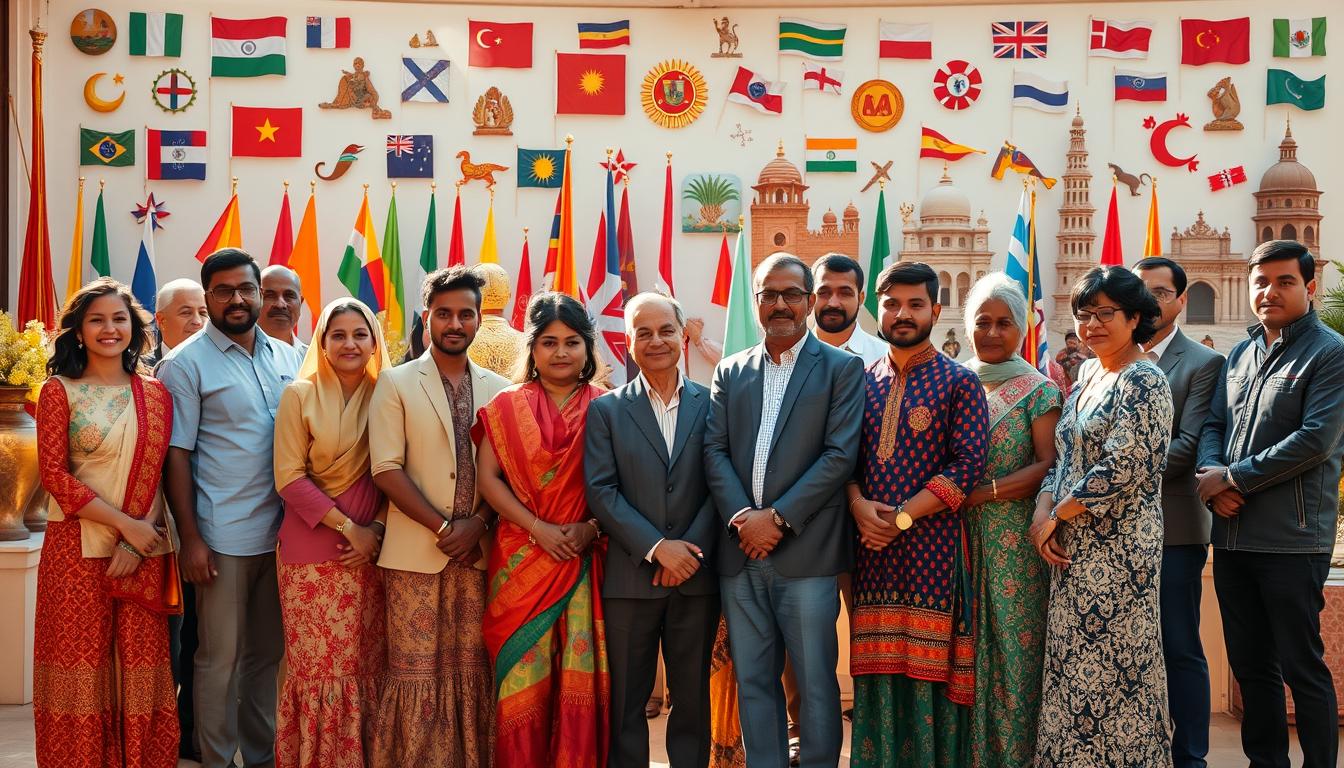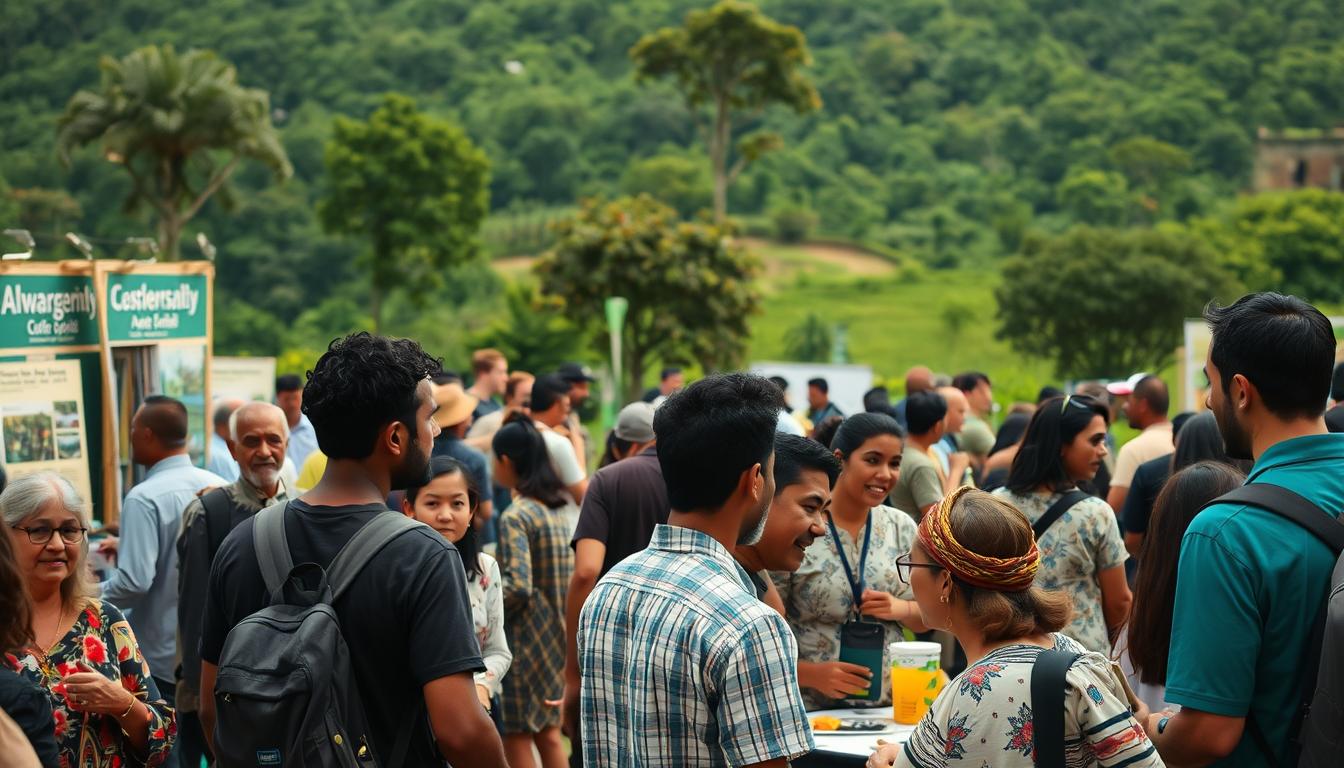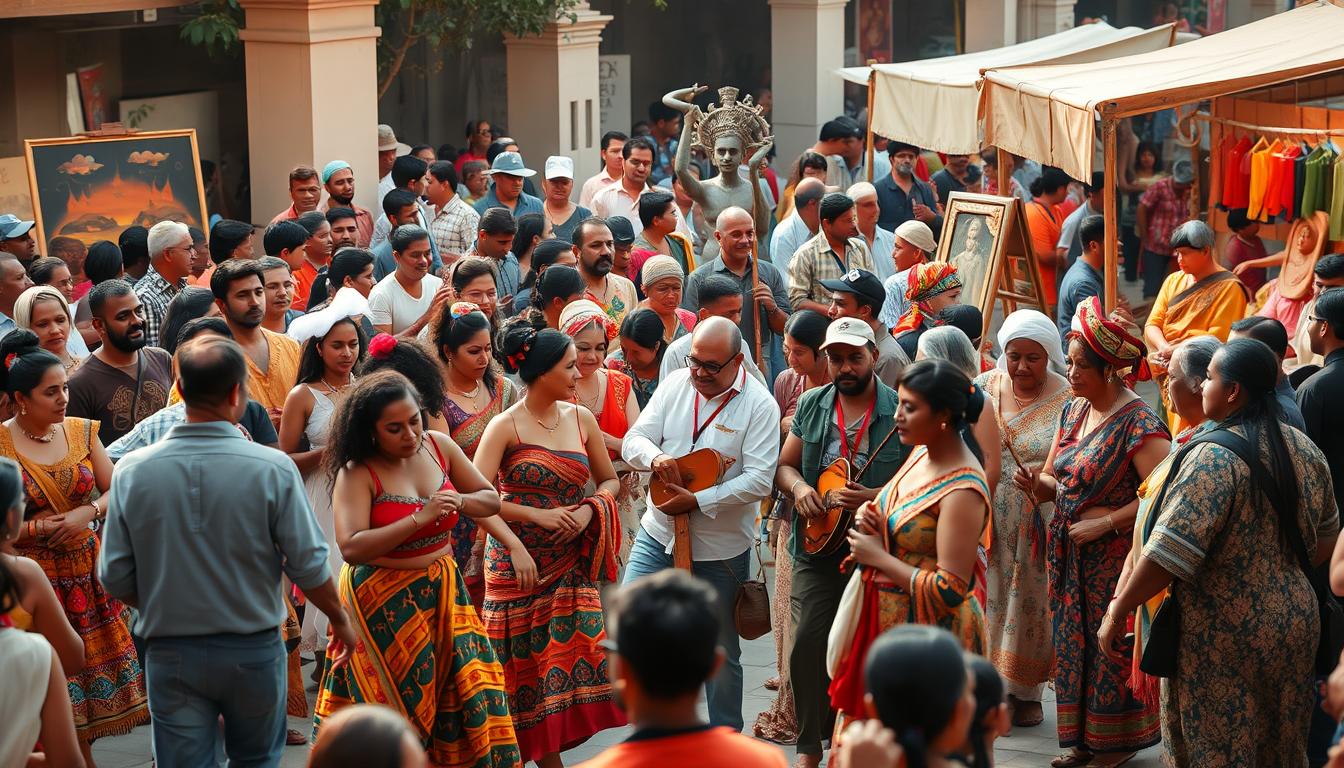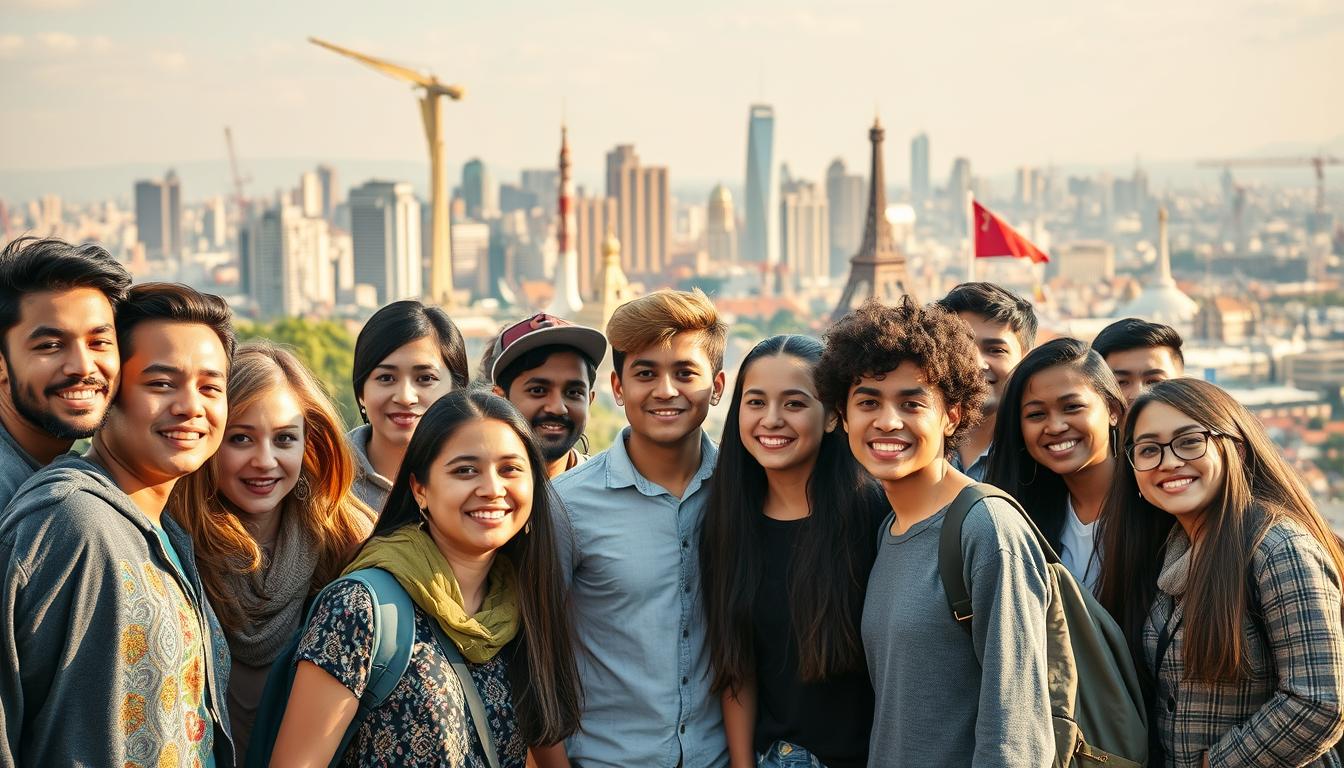Raising Global Awareness: Engaging in International Cultural Dialogues for Broader Perspectives
Anúncios
In today’s world, Global Awareness is key for working together and being good global citizens. Talking across cultures helps us understand and connect with others better. This introduction will show how these conversations can broaden our views and bring people closer together worldwide.
The Importance of Global Awareness in Today’s Society
In today’s fast-paced world, Global Awareness is more important than ever. It helps us see how we are all connected. This awareness is key for understanding the world from different viewpoints.
Understanding Global Interconnectedness
Global interconnectedness means we are all linked through our cultures and economies. Knowing about different cultures is vital. It helps us tackle big issues like climate change and economic gaps together.
Seeing our shared humanity encourages us to work together. This teamwork is crucial for solving global problems.
The Role of Education in Global Awareness
Education is the foundation for Global Awareness. It teaches us to value cultural diversity and social responsibility. A well-rounded education helps us think deeply and feel for others.
This education prepares leaders who can handle international challenges wisely. They will respect and understand different cultures.
Cultural Dialogues: A Pathway to Understanding
Cultural dialogues are key in helping us understand and connect with the world. They let us share our views, beliefs, and traditions with others. This helps us bridge gaps and learn from each other, fostering empathy and shared knowledge.
Definition and Significance of Cultural Dialogues
Cultural dialogues are about people from different backgrounds talking to each other. They offer a chance to see things from new perspectives. This enriches our understanding of the world’s diversity.
Groups like UNESCO see these dialogues as crucial for working together and building a cohesive society. They help us share our stories and understand global issues better.
How Cultural Dialogues Promote Global Awareness
Cultural exchanges, like workshops and community events, are vital for global awareness. They introduce us to new ideas and challenge our assumptions. This helps us feel connected to our world.
For example, schools working together can lead to creative exchanges. These highlight different cultures and encourage teamwork to tackle global problems.
Challenges in Promoting Global Awareness
Trying to spread global awareness is tough. It faces many hurdles like language gaps, political issues, and wealth differences. We must tackle these problems to help people understand each other better.
Identifying Barriers to Cultural Exchange
Cultural exchange is key to global awareness. But, it hits roadblocks. Language barriers can cause confusion, isolating groups. Political tensions make trust hard to find, making teamwork tough.
Economic gaps also play a part. They limit who can join in cultural activities. This makes it hard for those on the margins to be heard.
Addressing Prejudices and Misunderstandings
Prejudices and wrong ideas are big hurdles. They can keep us from really talking across cultures. It’s vital to have open talks that challenge these views.
By facing our biases, we can move past these obstacles. This helps us all grow in understanding each other’s cultures.
The Role of Technology in Raising Global Awareness
Technology is key in spreading awareness worldwide by making it easier to share information. Social media has changed how we connect with global issues. It lets us share our thoughts and experiences instantly, helping us understand different cultures better.
Utilizing Social Media for Engagement
Platforms like Twitter, Instagram, and Facebook are great for connecting online. They let us follow global campaigns and join in on discussions. This way, we can support causes we care about and feel part of a bigger community.
Virtual Events and Conferences as Tools
Virtual events and online conferences are now crucial for awareness. They help people from all over come together and share ideas. During the COVID-19 pandemic, technology became even more important for these gatherings.
Online platforms allowed for discussions, workshops, and panels to reach people worldwide. This showed how technology can bring us together in cultural conversations.
Engaging Youth in Global Issues
Getting young people involved in global issues is key to building global citizenship. Educational programs give them the tools to understand and tackle these problems. Programs like Model United Nations and global exchange initiatives help students become more aware of the world.
Educational Programs that Foster Global Awareness
Through various educational programs, youth learn about global challenges and their role in solving them. These programs help them think critically and take action. Examples include:
- Model United Nations, which simulates diplomatic discussions and negotiations.
- Global exchange programs that facilitate cross-cultural learning experiences.
- Workshops that focus on sustainability and community service.
Youth-Led Initiatives and Their Impact
Youth-led initiatives show the impact young people can have in making a difference. These initiatives tackle pressing global issues and empower participants to be community advocates. Some inspiring examples include:
- Environmental campaigns led by students that promote sustainability.
- Social justice movements mobilizing youth to advocate for equity.
- Technological projects that provide solutions to local problems.
The Importance of Diverse Perspectives
Engaging with diverse perspectives makes cultural dialogues richer and boosts global awareness. Each culture offers unique insights that help us understand more and find new solutions. By valuing cultural diversity, we gain a deeper appreciation of different viewpoints. This is key for becoming global citizens.
How Different Cultures Shape Global Awareness
Different cultures shape global awareness through their values, practices, and traditions. When people share their experiences, they show the complexity of global issues. This is important for tackling problems like poverty, climate change, and conflict.
By bringing together diverse voices, we get innovative ideas. This leads to better strategies and solutions for everyone.
The Value of Inclusivity in Cultural Dialogues
Inclusivity is crucial in cultural dialogues, leading to respect and collaboration. Embracing various perspectives helps us learn from each other, building empathy and understanding. This environment encourages everyone to participate, making sure all voices are heard.
This inclusivity strengthens community bonds and deepens our understanding of cultures.
Case Studies of Successful Global Awareness Campaigns
Looking at case studies gives us key insights into what makes global awareness campaigns work. Groups like Amnesty International and Greenpeace have shown us how to engage people and make a real difference. Their efforts help us understand the best ways to run successful campaigns.
Highlighting Effective Initiatives and Their Impact
Global awareness campaigns use many ways to get people to take action and push for change. Some standout initiatives have shown us how to be creative:
- Amnesty International’s “Write for Rights”: This effort gets people to write letters for those whose rights are broken. It has made a big difference, helping many.
- Greenpeace’s “Save the Arctic”: This campaign aimed to protect the Arctic. It used pictures and online actions to get people worldwide to care about saving the environment.
- The 2020 Black Lives Matter movement: This movement used social media to talk about racial injustice. It sparked big conversations and policy changes everywhere.
Lessons Learned from Global Awareness Efforts
Looking at these campaigns’ results teaches us a lot for the future. Here are some key lessons:
- Connecting with your audience is key. Knowing their culture and using stories they can relate to helps build strong bonds.
- Working together makes a bigger impact. Team up with other groups to gain trust and reach more people.
- Using technology helps spread your message. Social media and online tools can help you reach more people and get more involved.
Collaboration Between Nations and Organizations
Collaboration is key in raising global awareness. Non-governmental organizations (NGOs) and their partnerships play a big role. They work together to tackle big humanitarian issues and bring diverse cultures together.
This teamwork helps share different views. It makes the conversation about global problems richer and more diverse.
The Role of NGOs in Global Awareness
NGOs are vital in spreading awareness worldwide. They connect communities and speak up for those who are not heard. They focus on issues like poverty, education, and health.
By working together, NGOs can find new ways to solve problems. Their combined efforts lead to bigger changes.
Partnership Opportunities for Cultural Exchange
International partnerships open doors for cultural exchange. Working with local NGOs, global groups can reach more people. This exchange helps everyone understand each other better.
It builds strong networks for ongoing talks. Partnerships can be in many forms, like joint projects or educational programs. These efforts help raise awareness and build lasting ties between countries.
Measuring the Impact of Global Awareness Efforts
It’s key to know how well global awareness efforts work. We use many ways and tools to check their success. By mixing different methods, we get a full picture of how well our programs do.
Methods and Metrics for Assessment
There are many ways to measure success, including:
- Surveys and Questionnaires: Getting feedback from people helps us see if our efforts are working.
- Focus Groups: Talking to small groups gives us deep insights into cultural exchanges.
- Social Media Analytics: Looking at how people interact online shows us how interested they are in cultural topics.
- Observation and Case Studies: Using ethnographic methods shows us how global awareness changes people’s lives.
Long-term Benefits of Engaging Diverse Cultures
Working with diverse cultures brings lasting benefits. These include:
- Enhanced Global Cooperation: Knowing and valuing different cultures helps countries work better together.
- Improved Problem-Solving Capabilities: Teams with different backgrounds often find new ways to solve big problems.
- Strengthened Relationships: Keeping up cultural efforts builds trust and friendship among communities.
- Sustained Global Awareness Efforts: Keeping a focus on cultural programs makes our society more informed and caring.
Future Trends in Global Awareness Initiatives
The world of global awareness is changing fast. New technologies like artificial intelligence and augmented reality are making a big impact. They help people from different cultures connect and understand each other better.
These technologies create immersive experiences. They make it easier for people to join in on cross-cultural conversations. This way, we can learn from each other in new and exciting ways.
Emerging Technologies and Their Role
New technologies are changing how we talk about cultures. For example, virtual reality lets us explore places and traditions from anywhere. It helps us feel more connected and understand different ways of life.
These tools are becoming more common. Soon, they will help us share global awareness in even more powerful ways. People and groups will use them to reach out and connect with others worldwide.
Predicting Changes in International Cultural Dialogues
Digital communication and social movements are changing how we talk about cultures. We’re seeing a big push for inclusivity and representation. This means we’re learning from many different stories and viewpoints.
In the future, global awareness efforts will focus on working together. They will aim to build understanding and empathy. This shift is important as our world becomes more diverse and connected.
FAQ
What is Global Awareness and why is it important?
How do cultural dialogues contribute to Global Awareness?
What challenges exist in promoting Global Awareness?
How can technology enhance Global Awareness initiatives?
Why is it important to engage youth in Global Awareness?
How do different cultures shape Global Awareness?
Can you provide examples of successful Global Awareness campaigns?
What role do NGOs play in promoting Global Awareness?
How do we measure the impact of Global Awareness initiatives?
What future trends are expected in Global Awareness initiatives?
Published on: 28 de March de 2025

Luke Martin
Luke Martin, author of Credwallets.com, is a mathematics graduate with a specialization in financial markets. Known for his love of pets and his passion for sharing knowledge, Luke created the site to provide valuable insights into the complexities of the financial world. His approachable style and dedication to helping others make informed financial decisions make his work accessible to all, whether they're new to finance or seasoned investors.







